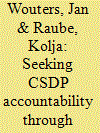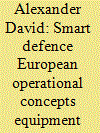| Srl | Item |
| 1 |
ID:
108780


|
|
|
|
|
| Publication |
2011.
|
| Summary/Abstract |
The Common Security and Defence Policy (CSDP) is in crisis. The concept of strategic culture is controversial, even more so at the European level. Yet as a historical context and as a grouping of shared beliefs and practices, it helps us to better understand how and why the promises of Saint-Malo were not met. A specific set of European political and security beliefs that should not be confused with a strategic culture were developed at the European level. The EU's misunderstanding of human security, combined with a widespread risk aversion, has transformed CSDP missions into political exercises, more focused on Europe's own image, posture and legitimacy than on the strategic requirements necessary to their success. The EUFOR Chad mission, the longest and most complex CSDP mission so far, was a good illustration of this problem. Moreover, this operation played a significant role in the French disillusion and estrangement from CSDP itself. The credibility and legitimacy of the Union in security and defence are now in doubt.
|
|
|
|
|
|
|
|
|
|
|
|
|
|
|
|
| 2 |
ID:
124619


|
|
|
|
|
| Publication |
2013.
|
| Summary/Abstract |
This article advances the argument that security integration is occurring in the European Union (EU) as a result of the influence of certain knowledge-based networks or epistemic communities. Given that EU member-states consistently resist integration in areas that are central to traditional state sovereignty, security integration presents a puzzle. The case of the EU Military Committee (EUMC) will serve as an example of how and why epistemic communities matter in security decision-making. Although the EUMC and the Common Security and Defence Policy are relatively new, the power of shared expertise among high-level military officers has already begun to dismantle sovereign barriers to security integration. In considering the puzzle of security integration, this article suggests that the epistemic community framework provides a better explanation for the emergence of a European security space than alternative arguments, such as principal-agent theory, intergovernmental bargaining, and regime theory. The case of a military epistemic community also serves to broaden the epistemic community literature, which tends to focus somewhat narrowly on cases of environmental and economics experts.
|
|
|
|
|
|
|
|
|
|
|
|
|
|
|
|
| 3 |
ID:
185346


|
|
|
|
|
| Summary/Abstract |
The paper analyses the Concept Development and Experimentation (CD&E) approach which has been developed and implemented in NATO over the last 20 years. NATO’s CD&E approach is explained as an organisational innovation and institutional response to external and internal pressures. Within the theoretical framing of institutional isomorphism, the paper analyses the adoption of CD&E in the European Union’s (EU) Common Security and Defence Policy (CSDP). The research hypothesis is that the EU will adopt and apply NATO’s CD&E approach in the EU’s defence planning and capability development process. The empirical findings from the analysis of the EU policy practice, however, show that CD&E has actually been adopted from NATO and applied by the EU to a very limited extent. The low degree of isomorphism between NATO and the EU with regard to applying CD&E is explained by a complex set of factors. The research results have broader implications, suggesting that under the current institutional settings it is highly unlikely CD&E to be adopted by other international organisations in the field of international security.
|
|
|
|
|
|
|
|
|
|
|
|
|
|
|
|
| 4 |
ID:
117714


|
|
|
|
|
| Publication |
2012.
|
| Summary/Abstract |
The EU's Common Security and Defence Policy (CSDP) requires parliamentary accountability. At present, as CSDP-related decisions are increasingly taken in the framework of the UN or the EU, neither the European Parliament (EP) nor national parliaments are able to hold decision-makers accountable. Interparliamentary cooperation can provide added value in bringing about parliamentary scrutiny of CSDP. Nevertheless, despite an official agreement, the EP and national parliaments have different views on what such interparliamentary cooperation entails. There are five conditions - cooperation and complementarity among parliaments, conferential dialogues, coordinated agendas, and comprehensive and comparative scrutiny - that have to be fulfilled to create added value for interparliamentary cooperation on CSDP matters.
|
|
|
|
|
|
|
|
|
|
|
|
|
|
|
|
| 5 |
ID:
122958


|
|
|
|
|
| Publication |
2013.
|
| Summary/Abstract |
The concept of smart defence that emerged from the NATO Brussels Summit in February 2011, developed from continuing multilateral dialog as EU nations pursue deference transformation in the face of rapidly evolving global challenges and continuing economic uncertainties. If MoDs of EU nations in and out of NATO are to adopt a flexible strategic posture for the future, one which supports national defence policy, as well as confirm to guidance of NATO's common security and defence policy (CSDP), they will need procurement reform that support new economic of scale.
|
|
|
|
|
|
|
|
|
|
|
|
|
|
|
|